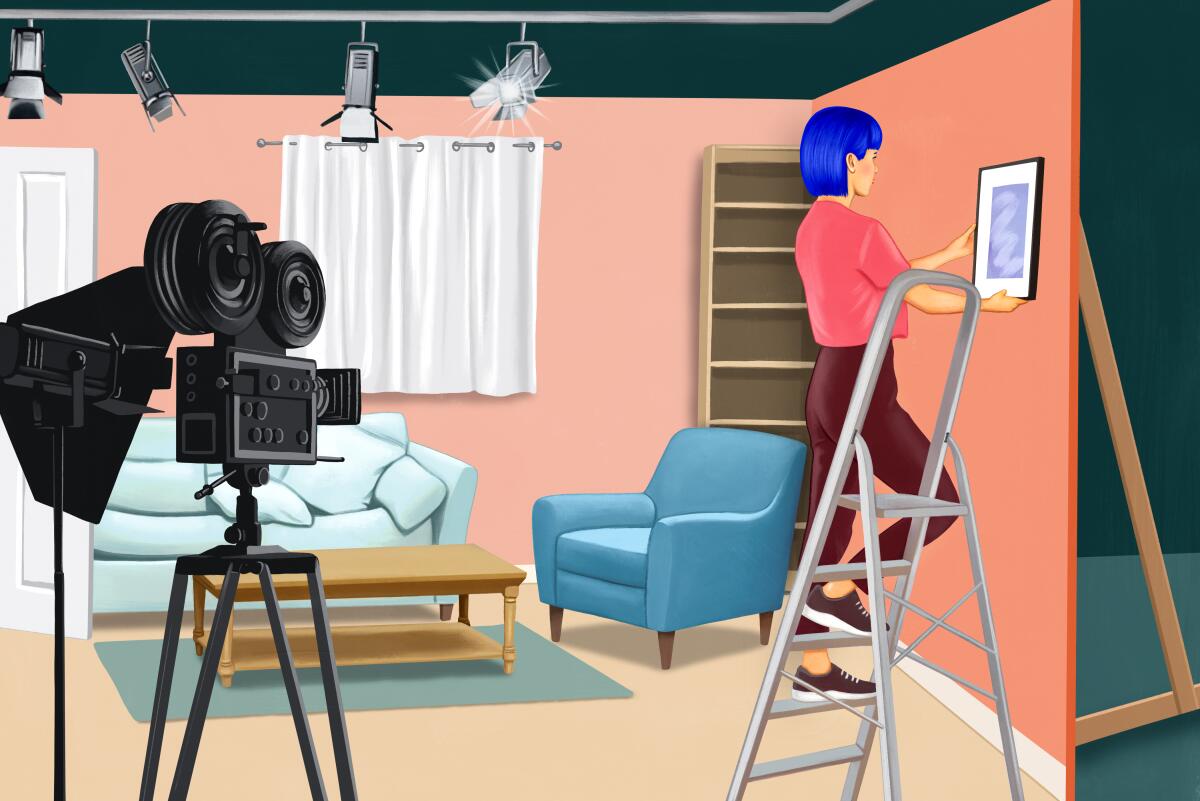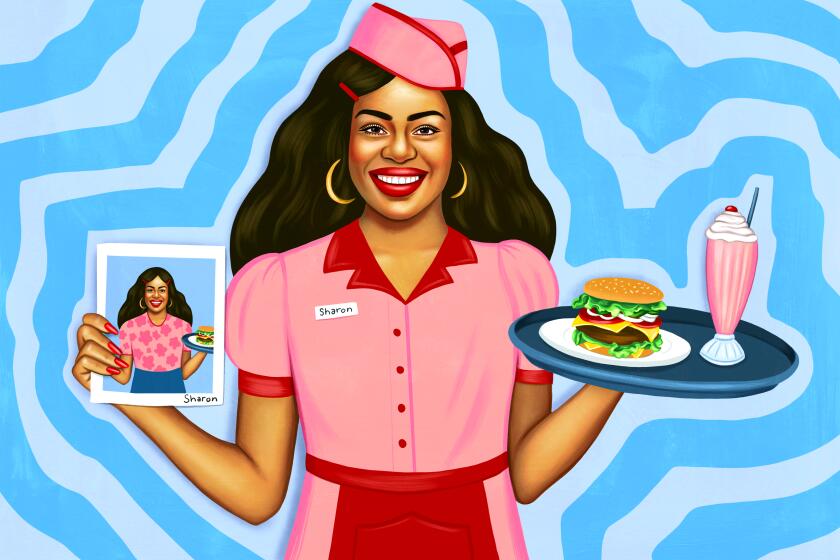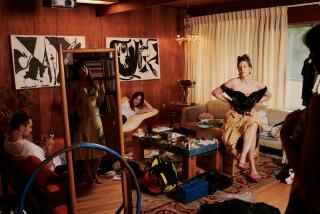Explaining Hollywood: How to get a job as a set decorator

The two-time Emmy-winning HBO series “Silicon Valley” follows a group of programmer friends working together to establish a company, Pied Piper.
In the last two seasons of the series, Brandi Kalish was hired as the show’s set decorator and tasked with giving character to the Pied Piper employee workspace.
“We had to sit at each desk and create a personality — like, this person is super into toys or LEGOs, this person is super organized or this desk only has a water bottle on it,” Kalish said.
To get some decorating inspiration for the hundreds of employee desks she and her team had to embellish for the show, Kalish went to San Francisco and toured several tech offices. As she visited these workspaces, she snapped reference photos to share with her team.
Kalish said it feels like putting puzzle pieces together on set.
A set decorator takes a script and creates a list of items — for example, furniture, lighting and artwork — for each set or environment that will be filmed. The decorator also will get direction and a budget from the projects’ showrunner, director and sometimes director of photography.
The Times interviewed Kalish and three fellow set decorators — Andrew Baseman (“Crazy Rich Asians” and “Severance”), Rae Deslich (“Promising Young Woman” and the reboot of “Supermarket Sweep”) and Rosemary Brandenburg (“Spider-Man: No Way Home” and “CastAway”) — to learn what it takes to become a set decorator and how to get into the industry.
Who becomes a set decorator?
Growing up in the Midwest, Kalish said she was “constantly coming up with ideas on how to redo my room.”
She went through a Southwest phase, which involved desert colors and asking her dad to sandblast cactuses on her windows — and then an all-black phase that included black window treatments and a black bedspread. Her love for textiles, furniture and art influenced her to go to art school for design.
For the record:
10:03 a.m. Aug. 17, 2022An earlier version of the article stated that Brandi Kalish dated a member of the band Korn. She dated a member of the band’s touring team. It also stated the band’s production designer needed a set decorator; it was the band’s manager.
In 1999, she was dating a member of Korn‘s touring team, and the band’s manager needed a set decorator to help transform the stage to look like a Gothic church.
Kalish looked in the phone book under “p” for prop house and went there with Korn’s credit card. She rented ornate candelabras, rugs, chandeliers and church kneelers.
All the pros The Times spoke to agree that a passion for art and the world around you is a necessity.
Deslich said you need a love for physical objects — and arts and crafts.
When they were a teenager, Deslich loved going to the renaissance fair but didn’t have a lot of money to buy costumes. They realized chainmail could be made with wire and a lot of patience.
“There’s a correlation between someone who looks at something and is like, ‘I think I can see how that’s made,’ and somebody who looks at a room and sees how a room is just a combination of all its elements,” Deslich said.
It’s about having an understanding that the world is movable, they said. You can pick up that piece of furniture and rearrange it or get it out of a space entirely if you don’t like it.
Set decorators also have to be organized, because whether you’re working on a film or a television series, you’ll be juggling multiple sets. Baseman has physical files of each of his sets. The files contain item lists, reference photos and other documents.
It’s also important to be curious and flexible.
Set decorating for “Crazy Rich Asians” took Baseman to Malaysia to learn about Peranakan culture. It also was an opportunity for him to work with an all-new local crew of buyers and assistants, instead of his go-to prop houses and shops.
“I really relied on them, and they found incredible pieces and showed me the lay of the land,” he said.
Production accountants are in high demand in the entertainment industry and can pull in high salaries with the right experience. Plus, you don’t have to be a CPA.
How do you get started?
Baseman’s parents were antique dealers, so he grew up with an appreciation for found objects and history. At Carnegie Mellon University, where he earned a bachelor’s degree in set and costume design, he started arranging and creating sets for theater, which led to opportunities on Broadway.
Many of the pros The Times talked to went to school — Kalish went to art school, and Deslich went to film school, thinking they wanted to be a director, writer or producer — which was helpful, but they say that there are many different paths, and it’s most important to fill whatever gaps you may have.
If you didn’t go to film school, read books on film theory, Deslich suggested.
Brandenburg majored in drama at Kenyon College in Ohio, but she said it was her real-world experience — exploring museums and historic sites in Europe as a kid when she traveled with her family on work trips — that influenced much of her early theater stage decoration.
A good resource for learning about set decorators is the Set Decorators Society of America. The guild provides resources, educational opportunities and networking opportunities with pros in the field.
What does it take to dress characters in a film a or television show, and how do you get started if storytelling through clothing is your passion? Hollywood costume designers explain.
What are the career paths?
All set decorators that The Times spoke to said there are many different ways of getting into the industry, but common ones involve working as a production assistant, moving up to assistant set dresser (and then lead man, which is the lead dresser) or becoming a buyer. Either track can lead to becoming an assistant set decorator before getting a shot to lead the team.
Deslich has worked as a production designer but said they found their niche as a set decorator. “Mostly I just want to decorate bigger and weirder projects,” Deslich said.
Set decorators also can work in different mediums.
After working on tour with Korn, Kalish started as an intern for production designer Michael Whetstone (“Curb Your Enthusiasm” and “Abbot Elementary”) at Whetstone Designs. She started out decorating stages for Britney Spears, Ice Cube and Eminem. Working with the bands led to music videos, which led to commercials and then to TV and film.
Similar to Kalish, after Baseman worked on Broadway, he started getting calls to decorate commercial sets and then moved on to television and film sets.
Production designers are both creatives and bosses.
How do you make money?
It’s common to start out as a set decorator on nonunion productions with microbudgets, working for little or no pay, Deslich said.
Once you have more experience under your belt, you can start working on the requirements to join the Affiliated Property Craftspersons IATSE Local 44 union.
To join, Baseman said it’s ideal to have experience as a production assistant and take union-provided classes specific to set decorators. You’re also required to take a test.
He said once you make the jump into the union, you get pension and healthcare benefits and a union-negotiated pay rate.
Baseman acknowledged that it takes time to get into the union, but he encourages newcomers to keep at it.
“Once you’re in, you’re good, and you’ll continue to work,” he said.
Once you gain enough experience, you’ll be able to negotiate for higher pay than the rates set in the union contract, Brandenburg said.
The first step in your Hollywood career shouldn’t be paying L.A. rent. Here’s how to take your first steps toward a career in the entertainment industry, according to experts.
How is this career different than it was 10 or 25 years ago?
High-definition television has changed the way set decorators design a scene, because viewers now can see every detail, Baseman said.
“I heard stories [about] soap operas when they were taped back in the ’60s and ’70s, where it was so low-resolution that rather than have rugs on the floor, they would just paint the floor to look like a rug,” he said.
It would save the project money. Now you can see “every fiber in the rug,” Baseman said.
Set decorators also have to keep lighting in mind when creating a specific scene or environment.
Brandenburg said because digital cameras are very sensitive to light, modern productions ramped up the use of the “practical lighting” technique. Rather than using a movie light overhead or off-camera, set decorators find desk lamps or hang fixtures to light the scene.
Set decorators work with the director of photography and the gaffer to make sure they provide the right light source, Baseman said. Does it need to be a hard lamp shade? Is an incandescent or fluorescent light better?
Smartphones also have changed the way set decorators can do research in the field. Kalish said she used to carry art books with her but now she can easily find reference photos online. She also can send photos to a showrunner for feedback.
For many people who pursue entertainment as a career, it takes years to get yourself to where you are making money from your creative work. For making money in the meantime, there’s always waiting tables. But more and more people are turning to platforms like TikTok, Twitch and Patreon.
What advice do pros hear that is wrong?
When young people start on set as a production assistant, Baseman said, there’s often a misconception that they’ll get to meet the actors and become friends with them. That’s not the case.
Baseman never met the stars of “Hocus Pocus 2,” a project he worked on last year.
When the cast arrived to film their scenes, the set was already decorated, and Baseman was already working on the next set.
“I’m always focused on the work, and I’m always two steps ahead of them,” he said.
Also, as newcomers start working on sets, they will hear “Just do anything” to get experience. But always try to work on something that is close to your goal, said Deslich.
When you are on a set, don’t get taken advantage of, they said. For example, don’t let a production work you for 20 hours in a row without feeding you or taking care of you.
Don’t be afraid to walk away, they said.
“There’s this perception of, ‘Oh, it’s a small town and you don’t want to burn bridges,’” Deslich said. “But no, it’s actually a very big town.”
It takes a team to design the hair in a film or television show, whether the goal is to impress viewers with intricate styles or to make the hair so seamless that no one thinks about it.
What’s some good advice?
Never stop researching: When she’s not arranging a set, Kalish said, she’s always “on a project with herself” — reading books, flipping through magazines or looking through Tumblr, Instagram and Pinterest for research.
Kalish will “go to buildings and travel to look at places I’ve never seen before or [revisit] places because it’s just a constant input that I’m collecting in my brain,” she said.
Use references from your own life experience: Baseman said he got a call for a project that was set in the 1980s. He was a young adult then and could recall certain items and pieces from those years for his decoration design.
Understand that your view of the world might not be the same as someone else’s: Brandenburg remembers going through a set walk-through of a middle-class home with a director. They had two different ideas of what middle class should look like, and she had to up-market the set to match what the director was looking for. You have to have an open mind when collaborating with others on the creation of a set, she said.
Send the L.A. Times your questions about breaking into and working in the entertainment industry.
More to Read
Inside the business of entertainment
The Wide Shot brings you news, analysis and insights on everything from streaming wars to production — and what it all means for the future.
You may occasionally receive promotional content from the Los Angeles Times.


















